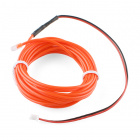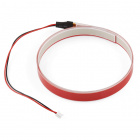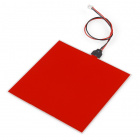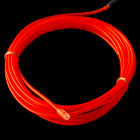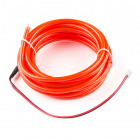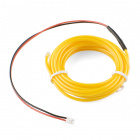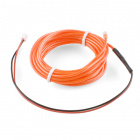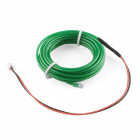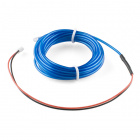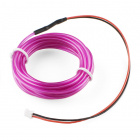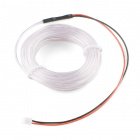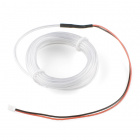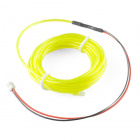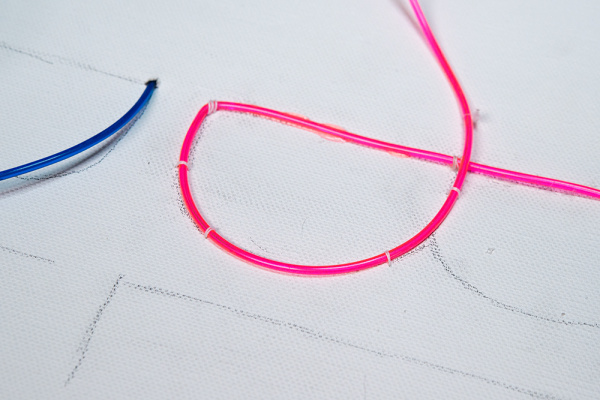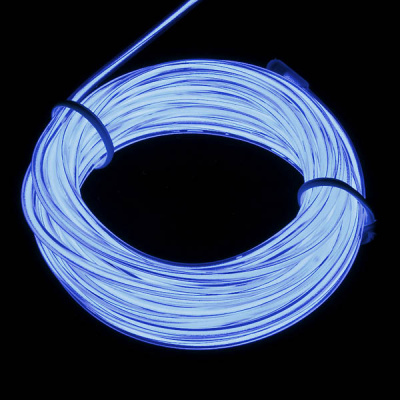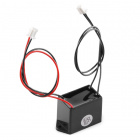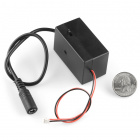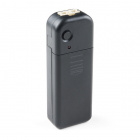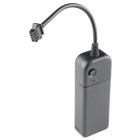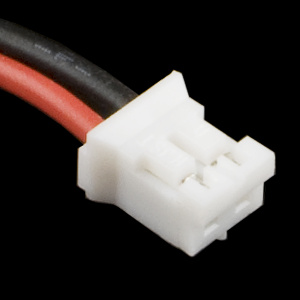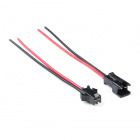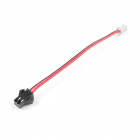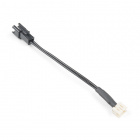Getting Started with Electroluminescent (EL) Wire
How EL Works
EL wire (short for electroluminescent wire) is particularly useful for many reasons. Nevertheless, there are a few characteristics to keep in mind.
EL Wire, Tape, Panel, Chasing Wire, Bendable Wire Forms
Electroluminescent products come in many different shapes and sizes. You can get it in wire (the most typical shape), tape, panels, and bendable form. All of these can be cut to any shape or size to achieve the desired effect. Just be sure to reseal the ends that have been cut.
EL Wire - Red 3m
COM-10191EL Tape - Red (1m)
COM-10796EL Panel - Red (10x10cm)
COM-10801EL Wire - Red 3m (Chasing)
COM-12931Bendable EL Wire - Red 3m
COM-14703Colors
EL also comes in many different colors. Below are a few options for standard EL wire.
EL Wire - Red 3m
COM-10191EL Wire - Yellow 3m
COM-10192EL Wire - Orange 3m
COM-10193EL Wire - Green 3m
COM-10194EL Wire - Blue 3m
COM-10195EL Wire - Purple 3m
COM-10196EL Wire - White 3m
COM-10197EL Wire - Blue-Green 3m
COM-10199EL Wire - Fluorescent-Green 3m
COM-10200There are other options available for EL tape, panel, chasing wire, and bendable wire.
Flexible
EL wire is flexible to a point. It allows you to sew it into clothing, attach it to moving parts, and bend it into any shape you desire. EL wire is more flexible than using LED strips but you will want to avoid sharp bends.
EL tape and panels can also be used in e-textile projects. However,they are not as flexible as EL wire. They are better in projects when there is reinforced fabric to support the material.
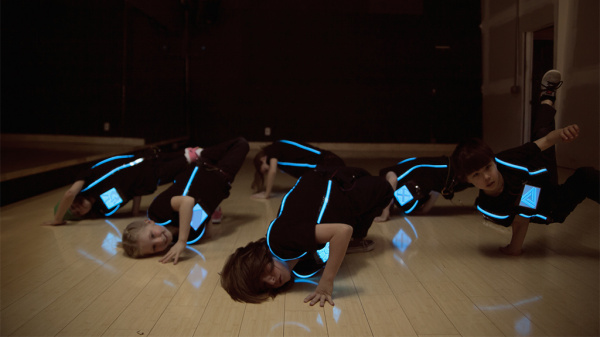 |
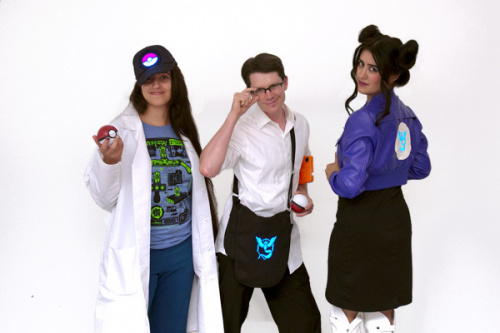 |
| EL Tape and Panels on Shirts | EL Panel Patches on a Hat, Bag, and Jacket |
Low Power Consumption
EL requires less power to operate compared to using several LEDs for a project. EL is also great because it is cool to the touch, even after being on for hours. Hence why it is often seen in clothing applications. The EL does not heat up because, rather than heating an element to achieve an optical phenomenon, the glowing in EL comes from sending an electrical current through the material, which is comprised of semiconducting mixtures. The electrons flowing through the material create photons, which create the glowing that we see as a result.
Let It Glow... In a Dark Room
While EL has a nice glowing effect, it can be hard to see in the daylight or when there is light in a room. It would be better to use EL in low light conditions for the best effect. The images below show an EL hoodie in a room with different lighting.
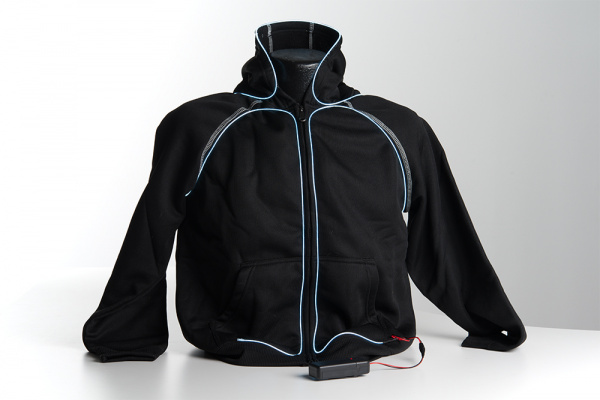 |
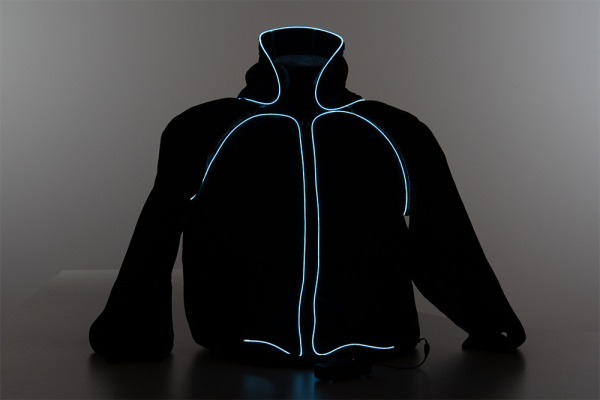 |
| EL in Bright Room | EL in Low Lighting |
AC Power
Many people ask, "Can't I just hook up EL wire to a battery?" The answer is, no! In order to operate EL wire properly, you must use AC (alternating current) power. This is similar to the power that comes out of your wall outlets at home, though outlets provide much more current than needed for EL wire. That's where the inverter comes in!
EL Inverter - 3v
COM-10201EL Inverter - 12v
COM-10469EL Inverter - Battery Pack
COM-11222EL Inverter - 3v (Chasing)
COM-12933The battery pack included in the EL starter kit and the chasing inverter are not just a battery holder. It houses an inverter as well. This inverter takes the DC (direct current) power produced by the batteries and turns it into AC. If you listen very closely to the inverter battery pack while it's on, you will hear a slight hum, similar to what you would hear if you stand under power lines or close to transformer boxes. Compared to the battery pack however, the 3V and 12V inverters do not have a battery holder build in.
With that, it's important to mention that the AC power coming from the inverter is not enough to hurt or kill you. However, it is enough to give you a good shock. Be careful when handling EL products and any exposed circuits that are powered on the AC side. You can cut EL to any length or shape, but you must reseal the ends you cut. If you do not have an end cap for the EL wire, you can still seal the ends with hot glue or epoxy to seal cut wire. If you don't reseal, you could end up getting a good jolt.
Anatomy of EL
EL consists of a few layers. Let's take a look at the anatomy of standard EL wire.
- Colored, Clear PVC Sleeve -- On the outside is a colored PVC sleeve. Depending on the manufacturer and color, this may be clear or translucent.
- Clear PVC Sleeve -- A second layer is yet another PVC sleeve. This sleeve is not as thick as the outer layer and is also clear.
- Corona Wires -- There are two thin wires that wrap around and extend to the end of the EL wire. These are very fine and can sometimes be referred to as angle wires. The wire pair is isolated from the center core.
- Phosphor Coating -- Applying AC power around the coating creates that nice glowing effect from the phosphor being excited. It also separates the corona wires and core.
- Core Wire -- At the center of EL wire is another wire.
On the left is a physical diagram of EL wire. On the right is a close up of white EL wire opened up. Regardless of the labels in the images, each component functions the same.
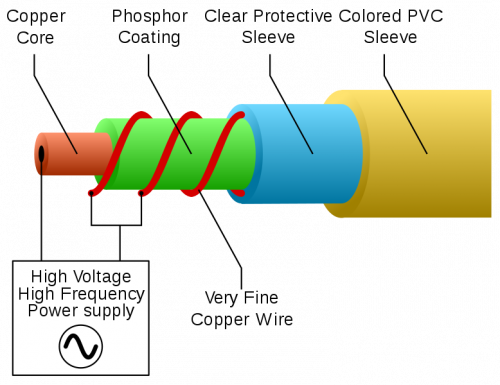 |
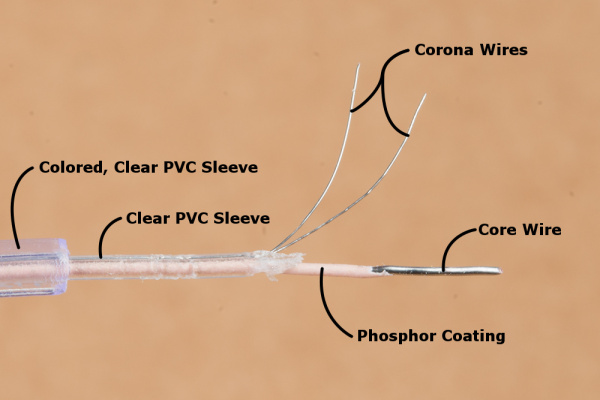 |
| Image courtesy of LogiNevermore from Wikipedia: Electroluminescent Wire | Closeup of Standard EL Wire |
Polarized Connector
The end of the EL wire is usually terminated with a polarized 2-pin JST-PH connector (with the exception of the polarized 4-pin chasing EL wire). The mating connector is populated on EL inverters and boards sold in the SparkFun catalog.
If you ordered EL wire from a different supplier, they could be terminated with a polarized 2-pin JST-SM connector. You could use the following adapters connect to the EL inverters and EL boards. PRT-14998 is used to connect EL wire from a different supplier to the SparkFun inverters and boards. PRT-14999 is used to connect SparkFun EL wire to inverters and boards sold from other supplies.
